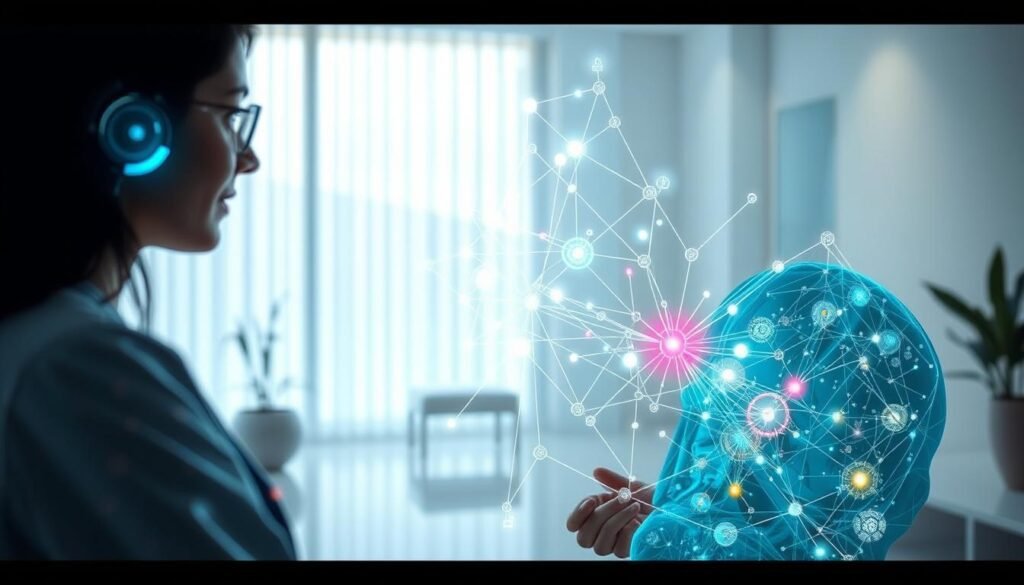Unlocking the Power of AI in Mental Health
Did you know that over 70% of participants in a recent study reported improvements in their mental health after using innovative tools? This statistic highlights the growing need for effective solutions in a world where mental health challenges are on the rise.
Artificial intelligence is stepping up as a game-changer in health care. Clinicians and researchers are leveraging this technology to develop personalized treatment plans and support patients more effectively. With shortages in mental health services, AI is emerging as a critical tool to bridge the gap.
From early intervention to improving care delivery, the potential of artificial intelligence is vast. This article explores how it’s transforming the system and helping people lead healthier lives.
Embracing the Intersection of AI and Mental Health
The fusion of artificial intelligence and mental health is reshaping care delivery in profound ways. By merging cutting-edge technology with traditional practices, we’re witnessing a revolution in how we diagnose, treat, and support individuals. This intersection is not just a trend—it’s a necessity in today’s world.
One of the most exciting developments is the rise of therapeutic chatbots. Tools like Woebot and Tess offer on-demand support, making care accessible anytime, anywhere. These platforms use machine learning and natural language processing to understand and respond to users’ needs effectively.
Digital tools are also helping to ease the burden on traditional mental health services. With a growing demand for care, these innovations provide scalable solutions. They ensure that more people receive the support they need, even when resources are limited.
Here’s how AI is making a difference:
- Enhancing early diagnosis through advanced data analysis.
- Personalizing treatment plans based on individual needs.
- Improving patient engagement with interactive platforms.
These advancements are not just about technology—they’re about creating a healthier, more supportive world. By embracing these tools, we’re taking a significant step toward better mental health for everyone.
How does AI work in mental health? Exploring Core Mechanisms
Advanced technologies are now being used to detect and monitor mental health conditions with greater accuracy. These tools analyze complex data to provide insights that were previously difficult to obtain. By leveraging patient records, voice analysis, and imaging data, these systems can pinpoint issues with remarkable precision.
One key technology is natural language processing. It helps interpret text and speech to identify patterns linked to conditions like depression or anxiety. Computer vision, another critical tool, analyzes facial expressions and body language to detect emotional states. Together, these methods offer a comprehensive view of a person’s mental well-being.

Machine learning plays a vital role in this process. It processes vast amounts of information from electronic health records and other sources. This allows for the development of diagnostic algorithms that can identify risks early. Studies have shown these systems can accurately detect conditions like schizophrenia and suicidal ideation.
Here’s how these technologies work together:
- Natural language processing interprets spoken or written words for emotional cues.
- Computer vision analyzes visual data to assess mental states.
- Machine learning algorithms process data to predict and diagnose conditions.
These innovations are not just about technology—they’re about improving care. By enabling early detection and personalized treatment plans, they help patients receive the support they need sooner. This approach is transforming mental health care, making it more effective and accessible for everyone.
Enhancing Diagnosis and Personalized Treatment
Precision in mental health care is now achievable through advanced tools that analyze complex data. These systems examine brain images, health records, and behavioral patterns to provide accurate diagnoses. This approach reduces risks and ensures patients receive the right care at the right time.
Personalized treatment strategies are evolving with continuous monitoring. For example, research from the University of California, Davis uses computer vision to tailor plans. This reduces the need for medication in some cases, offering safer alternatives.
Chatbots play a key role in therapy by offering on-demand support. They assist with interventions and improve follow-ups, making care more accessible. These tools are especially helpful for those who need immediate assistance.
Studies validate the effectiveness of cognitive behavioral therapy (CBT) when combined with deep learning. This technology enhances traditional methods, making therapy more effective. It’s a great example of how innovation supports mental health care.
Here’s how these advancements benefit patients:
- Improved accuracy in diagnosing conditions.
- Customized treatment plans based on individual needs.
- Enhanced support through interactive platforms.
These developments are transforming the way we approach mental health. By leveraging technology, we’re creating a system that’s both effective and compassionate. This ensures better outcomes for everyone involved.
Advancing Patient Engagement and Real-Time Support
Imagine having a personal assistant that keeps track of your mental well-being 24/7. Artificial intelligence is making this a reality with tools like chatbots and wearable apps. These innovations ensure you stay connected to your care journey, even outside traditional therapy sessions.
Automated reminders and targeted messaging are key features of these platforms. They help you stay on track with treatment plans and reduce the risk of missed appointments. For example, apps like BioBase monitor biometric data and behavioral indicators to provide timely alerts.
These tools also break down barriers to access. With round-the-clock support, you can get help whenever you need it. Real-world studies show significant improvements in patient follow-through and reduced missed appointments.
Here’s how these systems enhance care:
- Offer continuous monitoring for better outcomes.
- Provide personalized reminders to improve compliance.
- Ensure timely interventions with real-time alerts.
By leveraging technology, these tools create a more responsive and supportive care environment. They empower you to take control of your mental health journey, making care more accessible and effective.
Navigating Challenges and Bias in AI Applications
While AI is transforming mental health care, biases in data and algorithms remain a concern. These challenges can impact the accuracy and fairness of treatments. Understanding these issues is key to ensuring better outcomes for patients.
One major issue is bias in training data. If the data used to develop these tools lacks diversity, it can lead to misdiagnosis. For example, algorithms trained on limited datasets may not work well for all groups. This can perpetuate health disparities.
Replicating human empathy and clinical judgment is another hurdle. Algorithms can analyze data, but they struggle to understand emotions fully. This gap can affect the quality of care, especially in sensitive areas like therapy.
Collaboration between healthcare professionals and engineers is essential. Together, they can develop checks to reduce bias. This teamwork ensures that technology supports, rather than hinders, patient care.
Regulatory frameworks are also evolving to address these challenges. Policies are being put in place to ensure transparency and fairness. These steps help build trust in AI-driven health care systems.
Here’s what you need to know about these challenges:
- Bias in data can lead to unfair treatment outcomes.
- Algorithms may struggle to replicate human empathy.
- Collaboration between experts is crucial for improvement.
- Regulations are helping to ensure ethical use of technology.
By addressing these issues, we can harness the full potential of AI in mental health care. It’s about creating a system that’s fair, effective, and compassionate for everyone.
The Role of Policies and Ethical Frameworks in AI-Driven Care
Policies and ethical frameworks are shaping the future of AI in mental health care. These guidelines ensure that innovation benefits everyone while protecting patient privacy and safety. Without them, the risks of bias and misuse could outweigh the benefits.
Balancing innovation and privacy is a key challenge. Regulations like GDPR and CCPA set standards for handling sensitive data. These laws ensure that electronic health records and other personal information are used responsibly. They also help prevent misuse in areas like therapy and treatment planning.

Ethical frameworks are also addressing biases in AI systems. For example, algorithms trained on limited datasets may not work equally well for all groups. Guardrails in chatbots and digital tools are being developed to ensure fair treatment for everyone. This is especially important in life-critical decisions.
Here’s how policies and ethics are making a difference:
- Protecting patient data with strict privacy laws.
- Reducing biases in algorithms for fairer outcomes.
- Ensuring transparency in how AI tools are used.
Real-world examples show these frameworks in action. For instance, apps like Woebot now include ethical guidelines to prevent misuse. These steps help build trust in AI-driven care systems.
While the benefits are clear, risks remain. Automated systems can improve access to care, but they must not replace human judgment. By combining innovation with strong policies, we can create a system that’s both effective and compassionate.
Driving Innovation with Emerging AI Technologies
Emerging technologies are paving the way for a brighter future in mental health care. From virtual reality therapy to generative AI, these tools are reshaping how support is delivered. They offer new possibilities for personalized and immersive experiences, making care more accessible and effective.
Recent investments in startups highlight the growing interest in these innovations. For example, virtual reality platforms are being used to treat conditions like PTSD and anxiety. These tools create safe environments for patients to confront and manage their challenges.
Generative AI is another breakthrough, enabling chatbots to provide tailored support. These systems analyze user interactions to offer real-time guidance. They’re especially helpful for those who need immediate assistance outside traditional therapy hours.
Here’s how these technologies are making a difference:
- Virtual reality therapy offers immersive environments for treatment.
- Generative AI chatbots provide personalized, on-demand support.
- Predictive analytics identify high-risk individuals for early intervention.
Research and development play a crucial role in advancing these tools. Continuous improvements ensure they meet evolving patient needs. By combining innovation with compassion, we’re creating a future where technology and care work hand in hand.
Final Thoughts on the Future of AI in Mental Health
The future of mental health care is being reshaped by innovative technologies, offering new hope and possibilities. From improved diagnostics to personalized treatment plans, these advancements are transforming how we approach care. Patients now have access to tools that provide real-time support, making therapy more accessible and effective.
Ethical and policy frameworks are evolving to ensure these technologies benefit everyone. Collaboration between innovators, policymakers, and health professionals is key to addressing challenges like bias and data privacy. By working together, we can create a system that’s fair, compassionate, and effective.
Stay informed about these developments. Explore how these tools can enhance your health journey. The future is bright, and with the right approach, we can ensure better care for all.
FAQ
Q: What role does artificial intelligence play in mental health care?
A: Artificial intelligence helps analyze health records, predict risks, and provide personalized interventions. It supports diagnosis, treatment planning, and patient engagement through tools like chatbots and machine learning systems.
Q: Can AI improve access to mental health services?
A: Yes, AI-driven apps and platforms make care more accessible. They offer real-time support, therapy, and resources, especially for those in remote areas or with limited access to traditional services.
Q: How does AI ensure patient privacy in mental health care?
A: AI systems use secure electronic health records and comply with strict policies. Developers prioritize data encryption and ethical frameworks to protect sensitive information.
Q: What are the benefits of using AI for mental health treatment?
A: AI enhances treatment outcomes by providing data-driven insights, reducing wait times, and offering tailored interventions. It also helps identify patterns in patient behavior for better care.
Q: Are there risks associated with AI in mental health?
A: Potential risks include bias in algorithms and over-reliance on technology. Ongoing research and ethical guidelines aim to address these challenges for safer applications.
Q: How does AI support real-time mental health monitoring?
A: AI tools track patient states through apps and wearable devices. They analyze data to detect changes in mood or behavior, enabling timely interventions.
Q: What emerging technologies are shaping AI in mental health?
A: Innovations like advanced machine learning models and natural language processing are transforming care. These technologies improve analysis, diagnosis, and patient interaction.
Q: How can AI help reduce the stigma around mental health?
A: AI-powered platforms provide anonymous support, making it easier for individuals to seek help without fear of judgment. This fosters a more open dialogue about mental health needs.
Share this content:




Post Comment